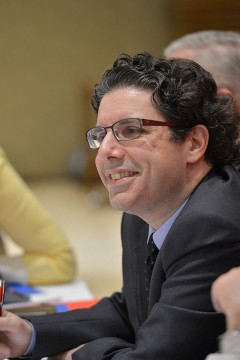Passage of Oil and Gas Decrees Casts Doubt on Transparency of Lebanon’s Decision-Making Process
Sami Atallah/LCPS executive director/January 04/2017
The Lebanese Centre For Policy Studies
As part of a series highlighting key challenges facing Lebanon, the Lebanese Center for Policy Studies has sought input from leading experts on what the new government’s priorities should be. In light of the cabinet passing two key oil and gas decrees on 4 January 2017, this article considers some remaining challenges facing the country’s nascent petroleum sector.
Lebanon’s new government passed two oil and gas-related decrees today, which had been collecting dust in the Council of Ministers (COM) for more than three years. This move is the culmination of years of delays in establishing the country’s petroleum sector. Although the issuing of these decrees is considered by many to be a positive step, it should at the same time cast doubt on the transparency of Lebanon’s decision-making process. While the government of former Prime Minister Tamam Salam failed to sign the two decrees despite forming an inter- ministerial oil committee in April 2014, Lebanon’s new Prime Minister Saad Hariri managed to approve the decrees in his first cabinet session. This raises concerns of backroom dealing, a blow to the accountability and transparency, particularly concerning complex and long-term issues like establishing a national petroleum sector. Additionally, it should be taken as a warning sign that this government is more than willing to resort to such methods—as opposed to gathering public and expert opinions—when making decisions affecting the future of Lebanon.
In addition to decree-related matters, significant challenges remain for the government concerning oil and gas, namely, formulating a long-term strategy for the energy sector. We, the Lebanese public, need to know how much energy Lebanon requires in the next decade and beyond, how the government plans to meet that need, and what the role of the offshore oil and gas sector is within that strategy. When speaking with government officials it becomes apparent that they have no qualms about telling us how the government has a strategy—though it has little substance that would even classify it as a strategy—which was produced in 2008 when the oil and gas markets were very different from today. As it stands today, there is little consensus about the strategy even among elites themselves, not to mention the wider public.
Although the Lebanese Petroleum Administration (LPA) has gone to great lengths to organize and participate in many workshops related to the oil and gas sector—including those that were jointly held with LCPS—there is a need to institutionalize the participatory process. This entails establishing how experts, CSOs, and think tanks will engage with the LPA, while also ensuring more decision makers are directly participating in this process. Such an arrangement would allow all concerned parties to inform one another about their work, exchange advice and constructive criticism, and ultimately result in building consensus about the sector.
Now that the two decrees have been passed, government agencies need to build capacity so they can better manage upcoming challenges in the sector. One such example is the Ministry of Environment. A recent LCPS policy paper argues that the responsibilities of the ministry must be better defined, its institutions strengthened, and “the procedures by which third parties are used for inspections and investigations should be developed, new legislation should be passed covering management and disposal of drilling and production wastes, and the provisions under which environmental assessments are carried out and environmental permits are issued must be finalized.”
It must also be ensured that the government take of petroleum revenues is maximized. To facilitate this, the government must open up a few of the offshore blocks, rather than all of them as desired by some of the political elite, so it can intensify competition. However, the number of blocks offered for licensing is only part of the story. Companies also need to seriously compete for these blocks. Out of forty-six pre-qualified firms, twelve of them are well-known large operators and thirty-four are non-operators. Looking at some of the latter, a worrying sign emerges. Some companies were established a few weeks before the deadline, calling into question the credibility of their qualifications. Many of these companies appear to be little more than middlemen, particularly those with capital not exceeding a few thousand dollars. Additionally, several international companies that made it through the pre-qualification round are co-owned, ranging between 10% and 100% of equity. While beneficial ownership of companies is in itself not problematic, it is essential that the LPA and other government agencies commit to disclosing information about company ownership shares and lower the threshold for disclosing this information.
In a related matter, the LPA and the government have expressed serious interest in joining the Extractive Industries Transparency Initiative (EITI) and are even boasting about the fact that Lebanon might become a member before issuing a license. However, as much as EITI can be useful in mitigating the risks of corruption, its usefulness is confined to certain phases of the value chain. In other words, EITI can help identity discrepancies between how much companies pay the state versus how much the government receives from them. But EITI does not tell us whether the government received an optimal deal. Also, it does not monitor the management of oil revenue, where most corruption takes place. This does not mean that Lebanon should not join EITI, but relying exclusively on it is not prudent. Lebanon needs to strengthen its own oversight agencies and accountability mechanisms to minimize the risks.
Here, the parliament must play an active role not only in legislation but in oversight. It is remarkable how ineffective the parliament has been in holding the government accountable for stalling the sector. In the last three years, the parliament has not bothered to hold one oversight session where it could pose questions to the government on where Lebanon stands in relation to the sector. This is not good news for Lebanon since accountability is a cornerstone of good governance. In fact, in a recent survey with members of parliament, only thirty-five out of sixty-five MPs knew that Lebanon’s economic zone is divided into ten blocks and only one MP actually knew that there are forty-six pre-qualified companies.
Lebanon’s sector is in a precarious situation. If political elites continue to undermine state institutions for their own end, then it is better that Lebanon’s oil and gas remain buried under the sea rather than burying us with heightened corruption and exacerbated inequality.






















